- Home
- Susan Hill
The Man in the Picture
The Man in the Picture Read online
THE MAN
IN THE
PICTURE
Other books by Susan Hill
NOVELS
The Woman in Black
In the Sprngtime of the Year
I’m the King of the Castle
The Bird of Night
SHORT STORIES
The Boy who Taught the Beekeper to read and other Stories
CRIMES NOVELS
The Various Haunts of Men
The Pure in Heart
The Risk of Darkness
THE MAN
IN THE
PICTURE
SUSAN HILL
First published in Great Britain in 2007 by
PROFILE BOOKS LTD
3A Exmouth House
Pine Street
London EC1R 0JH
www.profilebooks.com
Copyright © Susan Hill, 2007
1 3 5 7 9 10 8 6 4 2
Designed in Fournier by Geoff Green Book Design, Cambridge
The moral right of the author has been asserted.
All rights reserved. Without limiting the rights under copyright reserved above, no part of this publication may be reproduced, stored or introduced into a retrieval system, or transmitted, in any form or by any means (electronic, mechanical, photocopying, recording or otherwise), without the prior written permission of both the copyright owner and the publisher of this book.
A CIP catalogue record for this book is available from the British Library.
eISBN 978-1-84765-153-2
Stephen Mallatratt
Remembered with love and gratitude
THE MAN
IN THE
PICTURE
CONTENT
PROLOGUE
CHAPTER ONE
CHAPTER TWO
CHAPTER THREE
CHAPTER FOUR
CHAPTER FIVE
CHAPTER SIX
THE COUNTESS’S STORY
CHAPTER SEVEN
CHAPTER EIGHT
CHAPTER NINE
PROLOGUE
HE STORY was told to me by my old tutor, Theo Parmitter, as we sat beside the fire in his college rooms one bitterly cold January night. There were still real fires in those days, the coals brought up by the servant in huge brass scuttles. I had travelled down from London to see my old friend, who was by then well into his eighties, hale and hearty and with a mind as sharp as ever, but crippled by severe arthritis so that he had difficulty leaving his rooms. The college looked after him well. He was one of a dying breed, the old Cambridge bachelor for whom his college was his family. He had lived in this handsome set for over fifty years and he would be content to die here. Meanwhile a number of us, his old pupils from several generations back, made a point of visiting him from time to time, to bring news and a breath of the outside world. For he loved that world. He no longer went out into it much but he loved the gossip – to hear who had got what job, who was succeeding, who was tipped for this or that high office, who was involved in some scandal.
I had done my best to entertain him most of the afternoon and through dinner, which was served to us in his rooms. I would stay the night, see a couple of other people and take a brisk walk round my old stamping grounds, before returning to London the following day.
But I should not like to give the impression that this was a sympathy visit to an old man from whom I gained little in return. On the contrary, Theo was tremendous company, witty, acerbic, shrewd, a fund of stories which were not merely the rambling reminiscences of an old man. He was a wonderful conversationalist – people, even the youngest Fellows, had always vied to sit next to him at dinner in hall.
Now, it was the last week of the vacation and the college was quiet. We had eaten a good dinner, drunk a bottle of good claret, and we were stretched out comfortably in our chairs before a good fire. But the winter wind, coming as always straight off the Fens, howled round and occasionally a burst of hail rattled against the glass.
Our talk had been winding down gently for the past hour. I had told all my news, we had set the world to rights between us, and now, with the fire blazing up, the edge of our conversation had blunted. It was delightfully cozy sitting in the pools of light from a couple of lamps and for a few moments I had fancied that Theo was dozing.
But then he said, ‘I wonder if you would care to hear a strange story?’
‘Very much.’
‘Strange and somewhat disturbing.’ He shifted in his chair. He never complained of it but I suspected that the arthritis gave him considerable pain.
‘The right sort of tale for such a night.’
I glanced across at him. His face, caught in the flicker of the firelight, had an expression so serious – I would almost say deathly serious – that I was startled. ‘Make of it what you will, Oliver,’ he said quietly, ‘but I assure you of this, the story is true.’ He leaned forward. ‘Before I begin, could I trouble you to fetch the whisky decanter nearer?’
I got up and went to the shelf of drinks, and as I did so, Theo said, ‘My story concerns the picture to your left. Do you remember it at all?’
He was indicating a narrow strip of wall between two bookcases. It was in heavy shadow. Theo had always been known as something of a shrewd art collector with some quite valuable old-master drawings and eighteenth-century water-colours, all picked, he had once told me, for modest sums when he was a young man. I do not know much about paintings, and his taste was not really mine. But I went over to the picture he was pointing out.
‘Switch on the lamp there.’
Although it was a somewhat dark oil painting, I now saw it quite well and looked at it with interest. It was of a Venetian carnival scene. On a landing stage beside the Grand Canal and in the square behind it, a crowd in masks and cloaks milled around among entertainers – jugglers and tumblers and musicians and more people were climbing into gondolas, others already out on the water, the boats bunched together, with the gondoliers clashing poles. The picture was typical of those whose scenes are lit by flares and torches which throw an uncanny glow here and there, illuminating faces and patches of bright clothing and the silver ripples on the water, leaving other parts in deep shadow. I thought it had an artificial air but it was certainly an accomplished work, at least to my inexpert eye.
I switched off the lamp and the picture, with its slightly sinister revellers, retreated into its corner of darkness again.
‘I don’t think I ever took any notice of it before,’ I said now, pouring myself a whisky. ‘Have you had it long?’
‘Longer than I have had the right to it.’
Theo leaned back into his deep chair so that he too was now in shadow. ‘It will be a relief to tell someone. I have never done so and it has been a burden. Perhaps you would not mind taking a share of the load?’
I had never heard him speak in this way, never known him sound so deathly serious, but of course I did not hesitate to say that I would do anything he wished, never imagining what taking, as he called it, ‘a share of the load’ would cost me.
ONE
Y STORY really begins some seventy years ago, in my boyhood. I was an only child and my mother died when I was three. I have no memory of her. Nowadays, of course, my father might well have made a decent fist of bringing me up himself, at least until he met a second wife, but times were very different then, and although he cared greatly for me, he had no idea how to look after a boy scarcely out of nappies, and so a series of nurses and then nannies were employed. I have no tale of woe, of cruelty and harm at their hands. They were all kindly and well-meaning enough, all efficient, and though I remember little of them, I feel a general warmth towards them and the way they steered me into young boyhood. But my mother had had a sister, married to a wealthy m
an with considerable land and properties in Devon, and from the age of seven or so I spent many holidays with them and idyllic times they were. I was allowed to roam free, I enjoyed the company of local boys – my aunt and uncle had no children but my uncle had an adult son from his first marriage, his wife having died giving birth – and of the surrounding tenant farmers, the villagers, the ploughmen and black-smiths, grooms and hedgers and ditchers. I grew up healthy and robust as a result of spending so much time outdoors. But when I was not about the countryside, I was enjoying a very different sort of education indoors. My aunt and uncle were cultured people, surprisingly widely and well read and with a splendid library. I was allowed the run of this as much as I was allowed the run of the estate and I followed their example and became a voracious reader. But my aunt was also a great connoisseur of pictures. She loved English water colours but also had a broad, albeit traditional, taste for the old masters, and though she could not afford to buy paintings by the great names, she had acquired a good collection of minor artists. Her husband took little interest in this area, but he was more than happy to fund her passion, and seeing that I showed an early liking for certain pictures about the place, Aunt Mary jumped at the chance of bringing someone else up to share her enthusiasm. She began to talk to me about the pictures and to encourage me to read about the artists, and I very quickly understood the delight she took in them and had my own particular favourites among them. I loved some of the great seascapes and also the water colours of the East Anglia school, the wonderful skies and flat fens – I think my taste in art had a good deal to do with my pleasure in the outside world. I could not warm to portraits or still lifes – but nor did Aunt Mary and there were few of them about. Interiors and pictures of churches left me cold and a young boy does not understand the charms of the human figure. But she encouraged me to be open to everything, not to copy her taste but to develop my own and always to wait to be surprised and challenged as well as delighted by what I saw.
I owe my subsequent love of pictures entirely to Aunt Mary and those happy, formative years. When she died, just as I was coming up to Cambridge, she left me many of the pictures you see around you now and others, too, some of which I sold in order to buy different ones – as I know she would have wished me to do. She was an unsentimental woman and she would have wanted me to keep my collection alive, to enjoy the business of acquiring new when I had tired of the old.
In short, for some twenty years or more I became quite a picture dealer, going to auctions regularly and in the process of having fun at the whole business building up more capital than I could ever have enjoyed on my academic salary. In between my forays into the art world, of course, I worked my way slowly up the academic ladder, establishing myself here in the college and publishing the books you know. I missed my regular visits to Devon once my aunt and uncle were dead, and I could only make sure I maintained my ties to a country way of life by regular walking holidays.
I have sketched in my background and you now know a little more about my love of pictures. But what happened one day you could never guess and perhaps you will never believe the story. I can only repeat what I assured you of at the start. It is true.
TWO
T WAS A BEAUTIFUL day at the beginning of the Easter vacation and I had gone up to London for a couple of weeks, to work in the Reading Room of the British Museum and to do some picture dealing. On this particular day there was an auction, with viewing in the morning, and from the catalogue I had picked out a couple of old-master drawings and one major painting which I particularly wanted to see. I guessed that the painting would go for a price far higher than I could afford but I was hopeful of the drawings and I felt buoyant as I walked from Bloomsbury down to St James’s, in the spring sun-shine. The magnolias were out, as were the cherry blossom, and set against the white stucco of the eighteenth-century terraces they were gay enough to lift the heart. Not that my heart was ever down. I was cheerful and optimistic when I was younger – indeed, in general I have been blessed with a sunny and equable temperament – and I enjoyed my walk and was keenly anticipating the viewing and the subsequent sale. There was no cloud in the sky, real or metaphorical.
The painting was not, in fact, as good as had been made out and I did not want to bid for it, but I was keen to buy at least one of the drawings, and I also saw a couple of watercolours which I knew I could sell on and I thought it likely that they would not fetch high prices because they were not the kind of pictures for which many of the dealers would be coming to this particular sale. I marked them off in the catalogue and went on wandering round.
Then, slightly hidden by a rather overpowering pair of religious panels, that Venetian oil of the carnival scene caught my eye. It was in poor condition, it badly needed cleaning and the frame was chipped in several places. It was not, indeed, the sort of picture I generally liked, but there was a strange, almost hallucinatory quality about it and I found myself looking at it for a long time and coming back to it, several times. It seemed to draw me into itself so that I felt a part of the night-time scene, lit by the torches and lanterns, one of the crowd of masked revellers, or of the party boarding a gondola and sailing over the moonlit canal and off into the darkness under an ancient bridge. I stood in front of it for a long time, peering into every nook and cranny of the palazzi with their shutters opening here and there on to rooms dark save for the light of a branch of candles here, a lamp there, the odd shadowy figure just glimpsed in the reflected light. The faces of the revellers were many of them the classic Venetian, with prominent noses, the same faces that could be seen as Magi and angels, saints and popes, in the great paintings that filled Venice ’s churches. Others, though, were recognizably of different nationalities and there was the occasional Ethiopian and Arab. I absorbed the picture in a way I had not done for a long time.
The sale began at two and I went out into the spring sunshine to find some refreshment before returning to the auction rooms, but as I sat in the dim bar of a quiet pub, through the windows of which the sun lanced here and there, I was still immersed in that Venetian scene. I knew of course that I had to buy the picture. I could barely enjoy my lunch and became agitated in case something happened to prevent my getting back to the rooms to bid, so I was one of the first there. But for some reason, I wanted to be standing at the back, away from the rostrum, and I hovered close to the door as the room began to fill. There were some important pictures and I caught sight of several well-known dealers who would be there on behalf of well-to-do clients. No one knew me.
The painting I had at first come to bid for was sold for more than I had expected, and the drawings went quickly beyond my means, but I was almost successful in obtaining a fine Cotman watercolour which came immediately after them when some of the buyers for the lots in the first half had left. I secured a small group of good seascapes and then sat through one stodgy sporting oil after another – fat men on horseback, huntsmen, horses with docked tails giving them an odd, unbalanced air, horses rearing, horses being held by bored grooms, on and on they went and up and up went the sea of hands. I almost dozed off. But then, as the sale was petering out, there was the Venetian carnival scene, looking dark and unattractive now that it was out in the open. There were a couple of half-hearted bids and then a pause. I raised my hand. No one took me on. The hammer was just coming down when there was a slight flurry behind me and a voice called out. I glanced round, surprised and dismayed that I should have last-minute competition for the Venetian picture, but the auctioneer took the view that the hammer had indeed fallen on my bid and there was an end to it. It was mine for a very modest sum.
The palms of my hands were damp and my heart was pounding. I have never felt such an anxiety – indeed, it was close to a desperation to obtain anything and I felt oddly shaken, with relief and also with some other emotion I could not identify. Why did I want the picture so badly? What was its hold over me?
As I went out of the saleroom towards the cashier’s office to pay for m
y purchases, someone tapped me on the shoulder. I turned and saw a stout, sweating man carrying a large leather portfolio case.
‘Mr ...?’ he asked.
I hesitated.
‘I need to speak with you urgently.’
‘If you will forgive me, I want to get to the cashier’s office ahead of the usual queue ...’
‘No. Please do not.’
‘I beg your pardon?’
‘You must listen to what I have to say first. Is there somewhere we can go so as not to be over-heard?’ He was glancing around him as if he expected a dozen eavesdroppers to be closing in on us and I felt annoyed. I did not know the man and had no wish to scurry off with him to some corner.
‘Anything you have to say to me can surely be said here. Everyone is busy about their own affairs. Why should they be interested in us?’ I wanted to secure my purchases, arrange for them to be delivered to me, and be done.
‘Mr ...’ he paused again.
‘Parmitter,’ I said curtly.
‘Thank you. My name is not relevant – I am acting on behalf of a client. I should have been here far earlier but I encountered a road accident, some unfortunate knocked over and badly injured by a speeding car and I was obliged to stay and speak to the police, it made me too late, I ...’ He took out a large hand-kerchief and wiped his brow and upper lip but the beads of sweat popped up again at once. ‘I have a commission. There is a picture ... I have to acquire it. It is absolutely vital that I take it back with me.’

 Mrs De Winter
Mrs De Winter A Question of Identity
A Question of Identity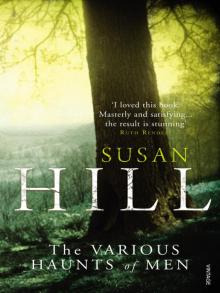 The Various Haunts of Men
The Various Haunts of Men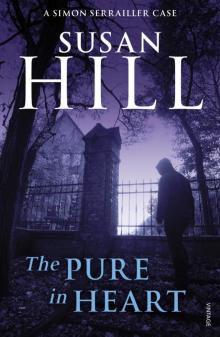 The Pure in Heart
The Pure in Heart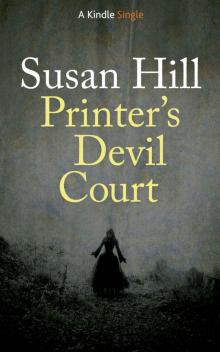 Printer's Devil Court
Printer's Devil Court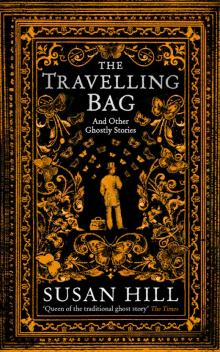 The Travelling Bag
The Travelling Bag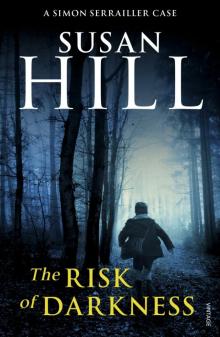 The Risk of Darkness
The Risk of Darkness A Kind Man
A Kind Man Black Sheep
Black Sheep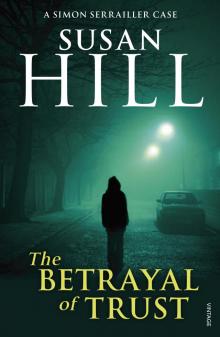 The Betrayal of Trust
The Betrayal of Trust The Service of Clouds
The Service of Clouds Betrayal of Trust
Betrayal of Trust The Small Hand
The Small Hand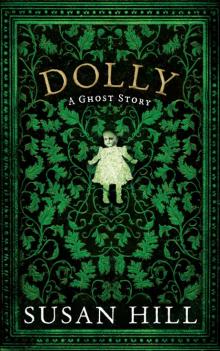 Dolly
Dolly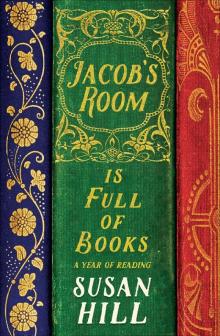 Jacob's Room Is Full of Books: A Year of Reading
Jacob's Room Is Full of Books: A Year of Reading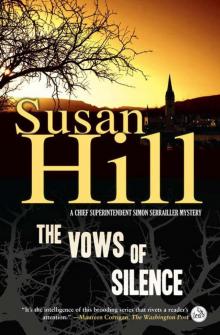 The Vows of Silence
The Vows of Silence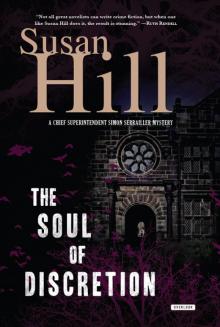 The Soul of Discretion
The Soul of Discretion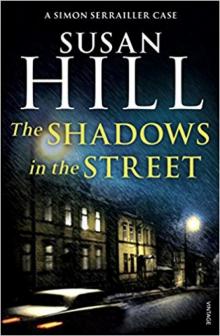 The Shadows in the Street
The Shadows in the Street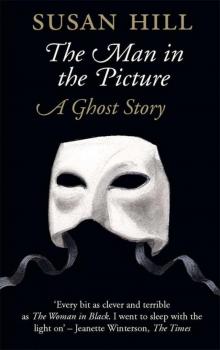 The Man in the Picture
The Man in the Picture Air and Angels
Air and Angels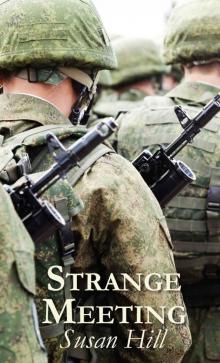 Strange Meeting
Strange Meeting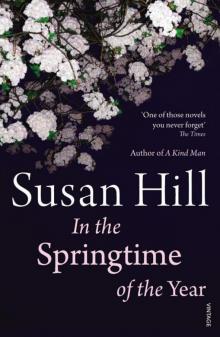 In the Springtime of the Year
In the Springtime of the Year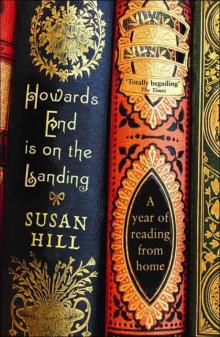 Howards End Is on the Landing: A Year of Reading From Home
Howards End Is on the Landing: A Year of Reading From Home From the Heart
From the Heart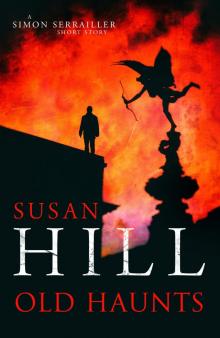 Old Haunts
Old Haunts The Mist in the Mirror
The Mist in the Mirror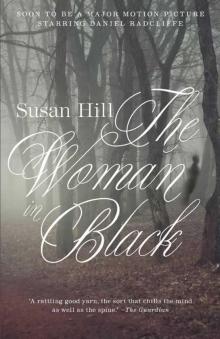 The Woman in Black: A Ghost Story
The Woman in Black: A Ghost Story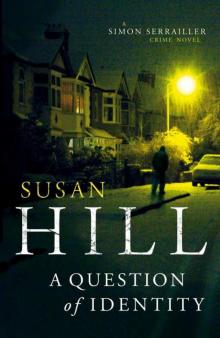 A Question of Identity (Simon Serrailler 7)
A Question of Identity (Simon Serrailler 7) The Comforts of Home
The Comforts of Home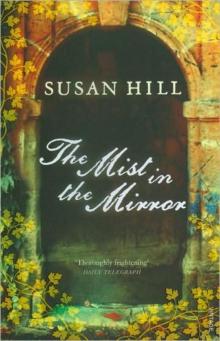 Mist in the Mirror
Mist in the Mirror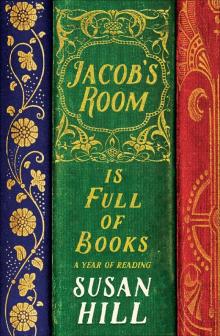 Jacob's Room is Full of Books
Jacob's Room is Full of Books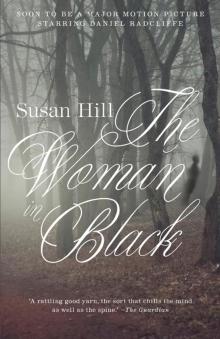 The Woman in Black
The Woman in Black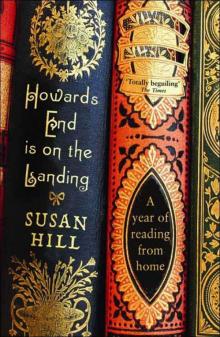 Howards End is on the Landing
Howards End is on the Landing